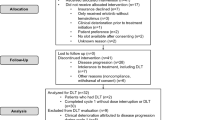Abstract
Purpose
Mammalian target of rapamycin (mTOR) inhibitors like temsirolimus may result in undesirable AKT upregulation. Metformin inhibits mTOR through different mechanisms and may enhance temsirolimus’s antitumor activity. We conducted an open-label phase I dose escalation trial of this drug combination in patients with advanced/refractory cancers.
Methods
Temsirolimus, 25 mg weekly, was combined with an escalating daily dose of metformin (level 1: 500; level 2: 1000; level 3: 1500; level 4: 2000 mg) by utilizing a standard 3 + 3 trial design. Treatment was administered in 28-day cycles following initial 2-week metformin titration during the first cycle.
Results
Twenty-one patients (median age, 56 years) with sarcoma (n = 8), colorectal (n = 3), endometrial (n = 4), uterine carcinosarcoma (n = 2), ovarian (n = 2), and other (n = 2) cancers were enrolled. Patients had received median of four prior systemic treatments. Two dose-limiting toxicities were observed (grade 3 mucositis, grade 3 renal failure); both patients continued treatment after dose modification. Fifty-six percent patients had stable disease as best response; clinical benefit rate was 22 %. Patients continued treatment for median of 11 weeks.
Conclusions
Combination temsirolimus/metformin was well tolerated with modestly promising effectiveness among this heavily pretreated patient cohort. We recommend a dose of temsirolimus 25 mg weekly and metformin 2000 mg daily for phase II study.

Similar content being viewed by others
References
Bjornsti M-A, Houghton PJ (2004) The tor pathway: a target for cancer therapy. Nat Rev Cancer 4(5):335–348
Carew J, Kelly K, Nawrocki S (2011) Mechanisms of mTOR inhibitor resistance in cancer therapy. Target Oncol 6(1):17–27. doi:10.1007/s11523-011-0167-8
Zakikhani M, Blouin M-J, Piura E, Pollak M (2010) Metformin and rapamycin have distinct effects on the AKT pathway and proliferation in breast cancer cells. Breast Cancer Res Treat 123(1):271–279. doi:10.1007/s10549-010-0763-9
Zakikhani M, Dowling R, Fantus IG, Sonenberg N, Pollak M (2006) Metformin is an AMP kinase-dependent growth inhibitor for breast cancer cells. Cancer Res 66(21):10269–10273. doi:10.1158/0008-5472.can-06-1500
Dowling RJO, Zakikhani M, Fantus IG, Pollak M, Sonenberg N (2007) Metformin inhibits mammalian target of rapamycin-dependent translation initiation in breast cancer cells. Cancer Res 67(22):10804–10812. doi:10.1158/0008-5472.can-07-2310
Rozengurt E, Sinnett-Smith J, Kisfalvi K (2010) Crosstalk between insulin/insulin-like growth factor-1 receptors and G protein-coupled receptor signaling systems: a novel target for the antidiabetic drug metformin in pancreatic cancer. Clin Cancer Res 16(9):2505–2511. doi:10.1158/1078-0432.ccr-09-2229
Kisfalvi K, Eibl G, Sinnett-Smith J, Rozengurt E (2009) Metformin disrupts crosstalk between G protein-coupled receptor and insulin receptor signaling systems and inhibits pancreatic cancer growth. Cancer Res 69(16):6539–6545. doi:10.1158/0008-5472.can-09-0418
Evans JMM, Donnelly LA, Emslie-Smith AM, Alessi DR, Morris AD (2005) Metformin and reduced risk of cancer in diabetic patients. BMJ 330(7503):1304–1305. doi:10.1136/bmj.38415.708634.F7
Bowker SL, Majumdar SR, Veugelers P, Johnson JA (2006) Increased cancer-related mortality for patients with type 2 diabetes who use sulfonylureas or insulin. Diabetes Care 29(2):254–258. doi:10.2337/diacare.29.02.06.dc05-1558
Cifarelli V, Lashinger LM, Devlin KL, Dunlap SM, Huang J, Kaaks R, Pollak MN, Hursting SD (2015) Metformin and rapamycin reduce pancreatic cancer growth in obese prediabetic mice by distinct microRNA-regulated mechanisms. Diabetes 64(5):1632–1642. doi:10.2337/db14-1132
Alimova IN, Liu B, Fan Z, Edgerton SM, Dillon T, Lind SE, Thor AD, Salvesen HB (2009) Metformin inhibits breast cancer cell growth, colony formation and induces cell cycle arrest in vitro. Cell Cycle 8(6):909–915
Jiralerspong S, Palla SL, Giordano SH, Meric-Bernstam F, Liedtke C, Barnett CM, Hsu L, Hung M-C, Hortobagyi GN, Gonzalez-Angulo AM (2009) Metformin and pathologic complete responses to neoadjuvant chemotherapy in diabetic patients with breast cancer. J Clin Oncol 27(20):3297–3302. doi:10.1200/jco.2009.19.6410
Hudes G, Carducci M, Tomczak P, Dutcher J, Figlin R, Kapoor A, Staroslawska E, Sosman J, McDermott D, Bodrogi I, Kovacevic Z, Lesovoy V, Schmidt-Wolf IGH, Barbarash O, Gokmen E, O’Toole T, Lustgarten S, Moore L, Motzer RJ (2007) Temsirolimus, interferon alfa, or both for advanced renal-cell carcinoma. N Engl J Med 356(22):2271–2281. doi:10.1056/NEJMoa066838
MacKenzie M, Ernst S, Johnson C, Winquist E (2012) A phase I study of temsirolimus and metformin in advanced solid tumours. Invest New Drugs 30(2):647–652. doi:10.1007/s10637-010-9570-8
Nathan DM, Buse JB, Davidson MB, Heine RJ, Holman RR, Sherwin R, Zinman B (2006) Management of hyperglycaemia in type 2 diabetes: a consensus algorithm for the initiation and adjustment of therapy. Diabetologia 49(8):1711–1721. doi:10.1007/s00125-006-0316-2
Liu H, Scholz C, Zang C, Schefe JH, Habbel P, A-c Regierer, Schulz C-O, Possinger K, Eucker J (2012) Metformin and the mTOR inhibitor everolimus (RAD001) sensitize breast cancer cells to the cytotoxic effect of chemotherapeutic drugs in vitro. Anticancer Res 32(5):1627–1637
Mackay HJ, Eisenhauer EA, Kamel-Reid S, Tsao M, Clarke B, Karakasis K, Werner HMJ, Trovik J, Akslen LA, Salvesen HB, Tu D, Oza AM (2014) Molecular determinants of outcome with mammalian target of rapamycin inhibition in endometrial cancer. Cancer 120(4):603–610. doi:10.1002/cncr.28414
Slomovitz BM, Jiang Y, Yates MS, Soliman PT, Johnston T, Nowakowski M, Levenback C, Zhang Q, Ring K, Munsell MF, Gershenson DM, Lu KH, Coleman RL (2015) Phase II study of everolimus and letrozole in patients with recurrent endometrial carcinoma. J Clin Oncol 33(8):930–936. doi:10.1200/jco.2014.58.3401
Soliman P (2015) A phase II, single-arm study of RAD001 (everolimus), letrozole, and metformin in patients with advanced or recurrent endometrial carcinoma. https://clinicaltrials.gov/ct2/show/study/NCT01797523?term=everolimus%2C+letrozole%2C+metformin&rank=1&show_desc=Y#desc. Accessed 11 April 2015
Acknowledgments
Authors acknowledge the support of Clinical Trials Support Resource and Department of Scientific Publications at M.D. Anderson Cancer Center.
Author information
Authors and Affiliations
Corresponding author
Ethics declarations
Conflict of interest
This work was funded by the National Cancer Institute at the National Institute of Health (Award Number P30CA016672). The authors declare that they have no relevant conflict of interest.
Rights and permissions
About this article
Cite this article
Khawaja, M.R., Nick, A.M., Madhusudanannair, V. et al. Phase I dose escalation study of temsirolimus in combination with metformin in patients with advanced/refractory cancers. Cancer Chemother Pharmacol 77, 973–977 (2016). https://doi.org/10.1007/s00280-016-3009-7
Received:
Accepted:
Published:
Issue Date:
DOI: https://doi.org/10.1007/s00280-016-3009-7




